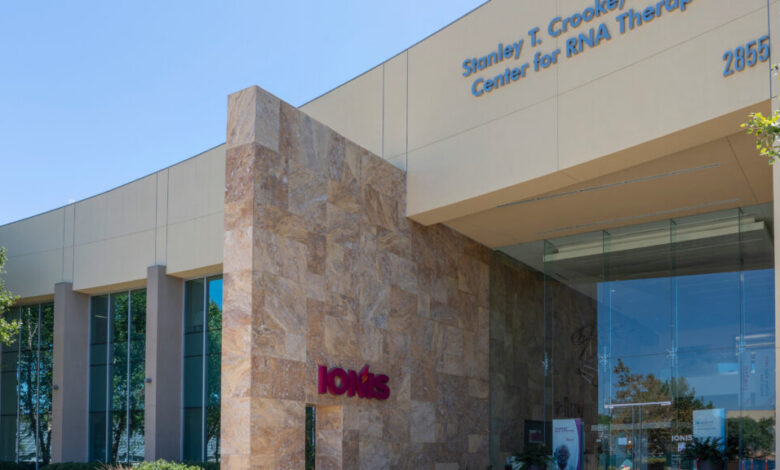Pfizer’s Lorbrena, Ultragenyx, Ionis, Sarepta

Want to stay on top of the science and politics driving biotech today? Sign up to get our biotech newsletter in your inbox.
Today, we see a gene therapy succeed in helping patients with a rare liver disease maintain their blood sugar. We see an Ionis drug do better than already-approved competitors in a rare swelling disease, and we see some conflict-of-interest issues from doctors on X.
Also, ASCO starts today! If you haven’t already, sign up for our flash ASCO newsletter here. STAT’s Matt Herper, Adam Feuerstein, Angus Chen, and Elaine Chen will be reporting from McCormick Place in Chicago.
The need-to-know this morning
- Advisers to the European Medicines Agency recommended the approval of a gene therapy for hemophilia B from Pfizer.
- Gilead Sciences said its cancer medicine Trodelvy failed to improve survival in patients with advanced metastatic bladder cancer. The Phase 3 TROPiCS-04 study was designed to confirm Trodelvy’s benefit in bladder cancer patients. The drug was granted accelerated approval in 2021.
Pfizer’s Lorbrena reduces rare lung cancer progression by 81%
New data being presented at ASCO on the long-approved Pfizer drug Lorbrena are remarkable: The daily pill decreased disease progression in non-small cell lung cancer by 81% over five years. That means that 60% of patients taking the drug were alive and didn’t see their tumors progress in that time, compared to 8% who received Xalkori, another Pfizer cancer drug.
Lorbrena was approved all the way back in 2001 for non-small cell lung cancer. It’s not exactly a top seller — it brought in $575 million last year, accounting for just 1% of the drug behemoth’s annual sales. So it’ll be interesting if the updated data will move the needle for sales of either Pfizer drug.
Ultragenyx gene therapy succeeds in late-stage trial
A gene therapy developed by Ultragenyx for a rare liver disease was successful in a Phase 3 trial — paving the way for a potential approval. The condition, called glycogen disease type 1A, is caused by a genetic mutation that prevents patients from maintaining blood sugar levels. Though it was once fatal, it’s now managed with regular doses of cornstarch — but it’s critical patients don’t miss even a single dose.
In a study of 49 patients, those who received the Ultragenyx therapy could take 41% less cornstarch than at the start of the trial. In comparison, patients in the placebo arm only took 10% less. While that’s statistically significant, the results are less profound than an earlier trial, which reduced patients’ needs by 72%. The gene therapy also failed a secondary endpoint.
Ionis drug outperforms other angioedema drugs on market
Donidalorsen, an RNA-targeting treatment for hereditary angioedema made by Ionis Pharmaceuticals, helped improve patient symptoms in a pair of late-stage trials — even for those who are taking medications for the disease that have already been approved. After 25 weeks, patients given the medicine monthly had 81% fewer bouts of severe swelling compared to placebo; when patients were given the drug every two months, the rates were still down 55%.
Another study showed that as time progressed, donidalorsen’s benefits grew — with swelling attacks dropping by 92% to 93%, regardless of how often patients were dosed. Interestingly, the patients who switched to donidalorsen from existing therapies from competitors like Takeda and BioCryst Pharmaceuticals saw their swelling attack rates drop by 62% compared to their previous treatment.
Ionis will use these data to apply for FDA approval by the end of the year. Otsuka, which has partnered with Ionis for European rights to the drug, will also apply this year for approval there.
An ASCO preview and another Duchenne trial failure
Which presentations are worth catching at ASCO this weekend? What is exon-skipping? And how do you pronounce bronchiectasis?
This week on “The Readout LOUD,” we preview some of the research that will be presented at the American Society of Clinical Oncology conference in Chicago. We also discuss the latest news in the health and life sciences, including a milestone in lung disease R&D and a Duchenne muscular dystrophy confirmatory trial failure.
Doctors on X who endorse drugs got paid by manufacturers
Many multitudes of physicians weigh in on X — formerly Twitter — and often endorse the prescription drugs they rely on most. But a new study shows that it’s likely that many have been paid, at some point or another, by the makers of these very drugs.
Tracking 28 physicians on X, the JAMA analysis found that 26 received at least one payment. And the average was more than $27,400 for things like food and beverages, speaking, consulting, or travel. In 24 cases, the payments were linked to a drug or device the physicians actively endorsed on social media.
Interestingly, two-thirds of the doctors who made these endorsements didn’t score highly on an index used to measure academic productivity, STAT’s Ed Silverman writes. Nearly half of the physicians did not disclose compensation from the manufacturers. The study’s authors are concerned that “the conflict of interest… may not be apparent to the general social media audience” because financial ties “were not consistently disclosed in posts.”
More reads
- Did Sarepta Therapeutics earn $4 billion from exon-skipping drugs that don’t work? STAT
- Summit shares soar after cancer drug tops Merck’s Keytruda, Bloomberg
- Wegovy maker Novo Nordisk sues nine spas, clinics and pharmacies over copycat drugs, Reuters
- ADHD game developer Akili Interactive to be taken private, after $34 million sale, FierceBiotech



